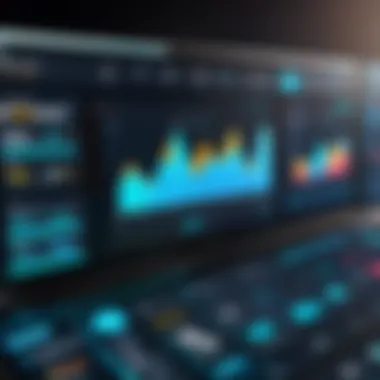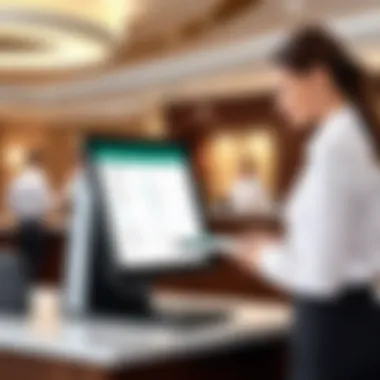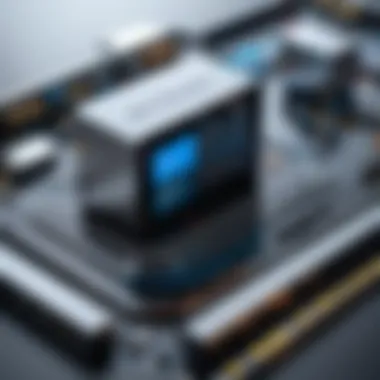RMS Hotel Software: Comprehensive Overview and Insights


Intro
In the realm of hospitality, the integration of technology has become pivotal for efficient management and enhanced guest experiences. RMS Hotel Software represents a significant advancement in this sector, offering tools designed to streamline operations for hotels, resorts, and other accommodations. By automating routine tasks, improving booking management, and enhancing guest engagement, RMS software systems allow property managers to focus on what matters most: delivering outstanding service. This article delves into the essential features, advantages, and challenges of adopting RMS Hotel Software, equipping professionals to make informed choices.
Software Overview
Key Features
RMS Hotel Software is not just a tool; it is a comprehensive solution that encompasses various functionalities tailored to the needs of the hospitality industry. Some of the key features include:
- Reservation Management: Facilitates efficient handling of bookings, cancellations, and modifications.
- Front Desk Operations: Streamlines check-in and check-out processes, including room assignments.
- Guest Management: Tracks guest preferences and history for personalized experiences.
- Integrated Billing: Combines all charges, simplifying the payment process for guests.
- Reporting and Analytics: Offers insights into occupancy rates, revenue streams, and guest feedback, helping management make informed decisions.
Furthermore, RMS solutions often include mobile accessibility, allowing staff to manage operations from various devices, enhancing flexibility and efficiency.
System Requirements
To effectively operate RMS Hotel Software, certain system requirements should be met. Typically, these include:
- Operating System: Compatibility with major platforms such as Windows and macOS.
- Hardware Specs: A computer with at least 4GB RAM, adequate storage, and reliable internet connectivity.
- Database Management: A modern database management system for storing and managing data efficiently.
Understanding these requirements is crucial for successful implementation and optimal performance.
In-Depth Analysis
Performance and Usability
When evaluating RMS Hotel Software, performance and usability are key factors. Efficient software should process bookings swiftly, ensure minimal downtime, and offer an intuitive user interface. User-friendly design reduces training time, ensuring staff can engage seamlessly with the software from day one. Moreover, advanced features like automated alerts and reminders enhance operational fluidity, reducing human error.
Best Use Cases
RMS Hotel Software can be particularly beneficial in various scenarios:
- Large Hotels: Handling vast numbers of bookings with complex requirements, including group reservations.
- Boutique Hotels: Personalizing guest interactions by leveraging data on preferences and behaviors.
- Resorts: Managing diverse amenities and activities seamlessly, integrating them within the booking process.
Using RMS Hotel Software effectively can drastically improve operational efficiency and guest satisfaction levels.
Harnessing the capabilities of RMS solutions allows properties to respond adeptly to market trends while ensuring an enhanced experience for every guest. As the industry evolves, staying informed about RMS software adaptations and upgrades becomes essential for maintaining competitiveness and achieving success.
Intro to RMS Hotel Software
Understanding RMS hotel software is critical for modern hospitality management. As the industry evolves, operational efficiency and guest satisfaction have become paramount. RMS software serves as a backbone for these improvements. By automating routine tasks and providing valuable insights, it empowers hoteliers to streamline operations and enhance guest experiences.
To appreciate RMS software fully, one must first define its core attributes. It stands for Reservation Management System. This system is central to hotel operations, managing bookings, facilitating guest interactions, and maintaining vital operational workflows. With features tailored to the unique needs of the hospitality sector, RMS software fosters seamless transaction processes and improved communication channels.
Furthermore, the historical context of hotel management software adds depth to its importance. Over time, hotel management systems have progressed from manual entries to sophisticated digital solutions. Early systems struggled with inefficiency, often leading to overbookings and guest dissatisfaction. As technology advanced, so did the capabilities of RMS software, evolving into integrated solutions that address contemporary challenges in hotel management.
Thus, RMS hotel software is not just a functional tool; it represents a significant evolution in how the hospitality industry operates. Understanding its foundations is essential for hoteliers aiming to thrive in a competitive landscape.
Key Features of RMS Hotel Software
RMS hotel software encompasses a variety of features that are crucial for enhancing hotel management. These features aim to streamline operations and improve guest satisfaction. A clear understanding of these functionalities is essential for any hotel professional. Not only do these features facilitate daily tasks, but they also enable hotel managers to make data-driven decisions. Therefore, evaluating the key features of RMS software is important for selecting the right system for your needs.
User Interface and User Experience


The user interface (UI) and user experience (UX) are of utmost importance in RMS hotel software. A well-designed UI ensures that staff can navigate the system with ease. This efficiency reduces training time and allows personnel to focus on guest services rather than struggling with technology. User experience enhances satisfaction; when the software is intuitive, employees experience less frustration. Modern RMS systems prioritize user-friendly design. Features like customizable dashboards and intuitive workflows are often highlighted.
Reservation Management
Reservation management is a core function of RMS software. These systems manage bookings for rooms and other services, helping to prevent double bookings and manage availability in real-time. This capability is vital in maximizing occupancy rates. Additionally, efficient reservation management allows hotels to offer a variety of booking options, such as direct bookings on their website or through third-party platforms. An integrated calendar view can support staff in seeing all reservations at a glance, making it easier to manage day-to-day operations.
Channel Management Capabilities
Channel management is another critical feature of RMS hotel software. This functionality allows hotels to distribute their room inventory across various online travel agencies (OTAs) and booking platforms. Effective channel management minimizes the risk of overbooking and aids in maintaining competitive pricing. Hotels can utilize dynamic pricing strategies, reacting to market fluctuations in real-time. A good RMS will facilitate seamless communication between various distribution channels, ensuring that information is consistent.
Billing and Invoicing Functions
Billing and invoicing are essential components of RMS software. This feature simplifies financial transactions for both the hotel and the guest. An effective billing system automates invoicing, allowing for accurate, timely, and transparent billing processes. This reduces errors and enhances trust between hotel staff and guests. Furthermore, integrating payment processing capabilities improves user experience and payment efficiency, making it easier for guests to settle their bills.
Reporting and Analytics Features
Reporting and analytics are fundamental for informed decision-making. RMS software collects a wealth of data that can be analyzed for trends and patterns. This analytics capability allows hotel management to assess performance metrics, such as occupancy rates, average daily rates (ADR), and revenue per available room (RevPAR). With these insights, managers can identify areas for improvement and optimize property performance over time. Moreover, customized reports can be generated to meet specific managerial needs, further informing strategic decisions.
Advantages of Using RMS Hotel Software
RMS hotel software offers significant benefits for the hospitality industry. This section highlights the importance of using this software and elaborates on critical aspects that contribute to the overall efficiency and effectiveness in hotel management. Implementing RMS can lead to considerable improvements in everyday operations.
Enhanced Operational Efficiency
One of the primary advantages of RMS hotel software is enhanced operational efficiency. Hotels face numerous challenges, from managing reservations to housekeeping schedules. With RMS software, these tasks become streamlined. The system automates daily functions, allowing staff to focus on guest service rather than administrative tasks. For example, the software can instantly update room availability, manage bookings, and handle check-ins and check-outs effectively.
Additionally, integrating RMS with other management tools helps ensure that every department works harmoniously. This integration reduces the risk of errors that can occur when information is manually entered multiple times. By optimizing processes, hotels can achieve better productivity, ultimately leading to cost savings and increased revenue.
Improved Guest Experience
Another significant benefit of RMS software is its impact on guest experience. The hospitality sector heavily relies on customer satisfaction. With RMS, hotels can deliver personalized service that meets or exceeds guest expectations. The software can track guest preferences and history, allowing staff to prepare for their arrival uniquely.
"An enhanced guest experience is key to repeat business in the hotel industry."
For example, if a guest frequently opts for a particular type of room or requests special amenities, the hotel can ensure these are ready before their check-in. Such attention to detail not only satisfies guests but also fosters loyalty and positive reviews.
Real-Time Data Management
Effective data management is crucial in the current fast-paced environment. RMS hotel software provides real-time data analytics that allows hotel management to make informed decisions quickly. Having access to up-to-date information about occupancy rates, revenue generated, and customer satisfaction helps management adjust strategies on the fly.
With real-time data, hotels can respond to market changes or emerging trends. This flexibility can lead to better pricing strategies and promotional offers, aligning perfectly with guest demand. Real-time data combined with analytical tools enables hotel operators to maintain a competitive edge in a crowded market.
In summary, the advantages of RMS hotel software are evident in operational efficiency, guest satisfaction, and data management. These factors together help hotels thrive in an increasingly challenging industry, ensuring they meet their goals and deliver outstanding service to their customers.
Challenges and Limitations of RMS Hotel Software
Understanding the challenges and limitations of RMS hotel software is crucial for hotel managers and IT professionals. While these systems can greatly enhance hotel operations, various obstacles can impede their effectiveness and overall adoption. It's essential to recognize these issues not only to navigate the complexities involved in implementation but also to maximize the potential of the software once it is integrated into the day-to-day workflow.
Customization and Integration Issues
One significant challenge that many hotels face with RMS software is the need for customization. Each hotel has unique operational flows, guest requirements, and management strategies. As a result, off-the-shelf RMS solutions may not meet all specific needs without some level of custom development. This necessity can lead to increased implementation time and costs.
Furthermore, integration with existing systems often presents problems. Many hotels rely on multiple software applications for various functions, from finance to customer relationship management. Ensuring that the RMS can seamlessly integrate with these other systems is crucial.
- Some common issues include:


- Data transfer errors between systems.
- System compatibility problems.
- Complexity in maintaining updates across platforms.
These problems can lead to fragmented data management, which defeats the purpose of having a centralized RMS. Hotel staff may still find themselves switching between different programs to access essential information, which can slow down processes and negatively affect the guest experience.
"An RMS that cannot integrate well with existing systems is often seen as a burden rather than a benefit."
Cost Considerations
Cost is another primary concern when it comes to RMS hotel software. While the promise of increased efficiency and enhanced guest satisfaction is alluring, the reality of costs can be daunting. Initial purchasing costs are often only part of the equation. Many hotels must also consider ongoing expenses such as training, support, and updates.
- Key cost-related factors include:
- Licensing fees can vary widely from vendor to vendor.
- Customization requires additional investments.
- Continuous training sessions are necessary as staff changes or software updates are implemented.
Budget-conscious hotels may find themselves weighing the benefits of advanced features against their available resources. There is also the risk of underestimating the financial commitment required for reliable support and maintenance. Thus, being realistic about the total cost of ownership is critical for decision-makers.
By carefully considering these challenges, hoteliers can avoid common pitfalls and make informed decisions regarding RMS software adoption.
Selecting the Right RMS Software
Choosing the appropriate RMS hotel software is a pivotal decision for any hotel management team. The right system can streamline operations, enhance guest satisfaction, and ultimately drive revenue growth. By understanding the key elements involved in making this selection, businesses can position themselves for future success.
Determining Business Needs
Before engaging with software vendors, it is crucial to assess the specific needs of the hotel. This involves analyzing current operational challenges and identifying areas that require improvement. Factors to consider include the scale of operations, the number of properties, and the unique characteristics of the guest demographic. For instance, a small boutique hotel may have different needs compared to a sprawling resort or a chain of hotels.
Another important aspect is the functionality that the hotel requires from the RMS software. Essential features may include channel management, reservation systems, and reporting tools. This evaluation should ideally involve input from key stakeholders, including front desk staff, management, and the IT department. Clear identification of business needs is the foundation upon which all other decisions will be built.
Evaluating Software Vendors
Once business needs are established, evaluating potential software vendors is the next step. Not all RMS solutions are created equal, hence a thorough comparison of features, pricing, and support is advisable. Look for vendors with a proven track record in the hospitality industry. Reading customer reviews and case studies can offer valuable insights into the vendor's reliability and the effectiveness of their software.
Considerations during evaluation should include:
- Customer Support: Assess the support options available, including response times and channels of communication.
- Customization: Explore how flexible the software is in adapting to the unique processes of your hotel.
- User Experience: A user-friendly interface can reduce training time and improve staff efficiency.
Creating a checklist or matrix of must-have features vs. nice-to-have features can help in making an informed choice.
Trial and Implementation
After selecting an RMS vendor, the next phase is trial and implementation. Many vendors offer a trial period to allow users to test the software. This trial is critical. It provides a real-world sense of how the software performs under daily operational conditions.
During this trial, it is necessary to invite team members from different departments to use the software. Their feedback can be instrumental in refining how the system will be utilized. Ensure that training allows staff to familiarize themselves with the system. A structured training process can enhance user adoption and minimize errors.
Once the trial phase is successful, a detailed implementation plan should follow. This plan should outline timelines, responsibilities, and any necessary adjustments to hotel operations. Also, factor in time for data migration from any existing systems to the new RMS.
Integration with Other Systems
The ability to integrate with other systems is crucial for RMS hotel software. This capability facilitates streamlined operations and enhances overall functionality. Effective integration means that different software solutions within a hotel’s operational ecosystem can communicate seamlessly. This results in improved data accuracy, reduced manual entry, and ultimately increases operational efficiency.
Moreover, well-integrated systems lead to better guest experiences. When software solutions work together, they can provide comprehensive insights. These insights allow hotel management to make informed decisions based on real-time data. Such integration is no longer optional; it has become a necessity in modern hotel management practices.
Integrating with Property Management Systems (PMS)
Integrating RMS hotel software with Property Management Systems (PMS) forms the backbone of hotel operations. A PMS handles various tasks such as room bookings, check-ins, and guest management. When RMS software communicates effectively with the PMS, several benefits arise.


- Unified Data Management: Integration ensures that data is consistent across platforms. This prevents discrepancies that could lead to operational errors.
- Efficiency in Operations: Automated updates between systems save time, allowing staff to focus on guest interactions rather than administrative tasks.
- Enhanced Reporting: Bringing together data from RMS and PMS allows for more comprehensive analytics. Management can analyze trends and make strategic decisions quickly.
Integration with Payment Gateways
Payment gateways are essential for processing transactions securely in the hospitality sector. RMS hotel software must integrate with these systems to facilitate various payment methods. This integration comes with multiple advantages.
- Security: Robust integration enhances transaction security, protecting sensitive guest information.
- Convenience: Guests can pay using their preferred methods, whether credit cards or digital wallets. This flexibility improves guest satisfaction.
- Streamlined Processes: Automated billing means fewer manual entries and less room for errors in financial records.
Furthermore, seamless integration with payment gateways ensures that revenue tracking is precise and real-time. This allows hotel managers to monitor financial performance swiftly and adjust strategies accordingly.
Linking with Marketing Tools
Integration of RMS software with marketing tools is vital for executing effective promotional strategies. Marketing tools allow for targeted communications with guests, which can lead to increased bookings and enhanced guest relationships.
- Data Utilization: Integrating RMS with tools like Mailchimp or HubSpot enables the use of data for personalized marketing campaigns. This leads to better open rates and engagement from potential guests.
- Campaign Tracking: Marketers can track the effectiveness of their campaigns directly through RMS, providing insights into which tactics are successful.
- Improved Customer Relationships: With integrated marketing tools, hotels can maintain a consistent dialogue with guests, fostering loyalty and repeat business.
Future Trends in RMS Hotel Software
The landscape of hotel management is rapidly evolving. Understanding future trends in RMS hotel software is crucial for hotels that aim to stay competitive. These trends not only reflect the technological advancements but also adapt to changing guest expectations. Keeping an eye on these developments can help businesses make informed decisions regarding implementations and upgrades. As hotels integrate more digital solutions, the relevance of these trends will shape the guest experience and operational efficiency.
The Role of Artificial Intelligence
Artificial Intelligence (AI) is redefining the scope of RMS hotel software. Its integration streamlines operational processes, making them quicker and more efficient. AI can predict guest preferences by analyzing past behaviors. This fosters a personalized experience, which can lead to higher guest satisfaction levels.
Common uses of AI in RMS include automated responses in customer service and smart room configurations. AI-driven tools also help revenue management by dynamically adjusting pricing based on demand forecasts and market trends.
The potential for AI in RMS is extensive. However, it requires careful implementation to ensure it enhances rather than complicates existing processes. AI systems must be trained properly and integrated seamlessly with existing software to yield beneficial results.
Mobile and Cloud-Based Solutions
Mobile and cloud-based solutions are becoming standard in the hospitality industry. The demand for flexibility has driven hotels to seek RMS that function across multiple devices and platforms. Cloud-based RMS offer several advantages:
- Accessibility: Staff can access the system from various locations, which is critical for chain hotels with multiple properties.
- Cost Efficiency: Cloud solutions typically reduce the need for expensive hardware and maintenance.
- Scalability: Cloud-based systems can easily adapt to changing business needs, accommodating growth without requiring major overhauls.
Mobile functionality allows for real-time updates and remote management. Staff can manage reservations, handle guest inquiries, and generate reports on the go. This improves response time and enhances the overall guest experience.
The trend toward mobile and cloud-based RMS solutions is not just about convenience. It aligns with broader industry shifts toward flexible, data-driven operations that prioritize customer engagement.
"Investing in future-ready RMS technology is not just about staying current. It's about being proactive in shaping the guest experience and operational excellence."
Keeping abreast of these trends is vital for hotel operators and technology stakeholders alike.
Closure
In the midst of rapid advancements and changes in the hospitality industry, RMS hotel software stands out as an essential tool for hotel management. Its adoption presents numerous benefits that are crucial for operators striving to enhance their services and operational efficiency. The features of RMS software not only streamline reservation processes but also provide vital data for improved decision-making.
When considering the adoption of RMS software, one should reflect on several vital elements. First, understanding the business's unique needs is key. Each hotel has its own set of challenges and requirements, and choosing software that aligns closely with these specifications will enhance its effectiveness. Additionally, evaluation of various vendors ensures a selection that will provide a solution tailored for the particular environment of your hotel.
Another essential aspect involves being aware of the technical considerations surrounding implementation. The process can be complex, and involves training staff to maximize the utility of the software. Without proper understanding, the hotel may not fully benefit from its potential. Therefore, prioritizing employee training and support during the transition phase is important for successful RMS software adoption.
Furthermore, understanding the costs associated with this software is essential. Licensing fees, maintenance costs, and potential integration expenses can impact budgeting decisions. However, the long-term benefits often outweigh these initial costs, resulting in better revenue generation and efficiency.
"The right RMS hotel software not only simplifies operations but significantly enriches the guest experience, making it a worthwhile investment for any hotel."
In summary, as the hospitality landscape continues to evolve, RMS hotel software serves as a cornerstone for effective management practices. By carefully considering specific needs, vendor capabilities, implementation processes, and associated costs, hotel operators can ensure they make informed decisions that will lead to enhanced operational effectiveness and improved guest satisfaction.
Final Thoughts on RMS Software Adoption
Adopting RMS hotel software is not merely a trend; it is a necessary progression for modern hotel management. The insights gained from this software play a pivotal role in improving daily operations and elevating the guest experience. Understanding both the benefits and possible challenges can equip hotel managers to make wise choices that reflect their strategic goals.
In closing, embracing RMS solutions facilitates a more adaptable and informed business approach, essential in today’s competitive market. As more hotels leverage these tools, it becomes ever more critical to stay aware of the latest developments and integrations within the RMS landscape.







